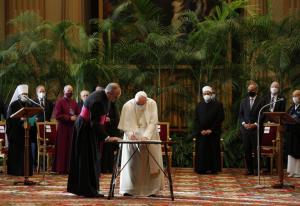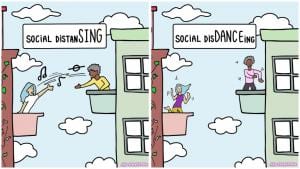
Forty faith leaders, including Pope Francis and other representatives of major religions published an appeal to the nations on October 4, the Feast of St. Francis. They called for urgent action on the “grave threat” facing all the peoples of the world from climate change.
Faith leaders from the main Christian denominations, Judaism, Islam, Buddhism, Hinduism, and others signed off on the need for international political action to guard and heal our wounded humanity and our stressed planet. Pope Francis hand delivered the statement to leaders of COP26, the next Climate Change Conference, to take place in Glasgow, Scotland, beginning October 31.
Twice 40 days observances
On a parallel track, a major push by the worldwide Catholic Church to implement the recommendations of Pope Francis’ encyclical on the environment, Laudato Si, on Care for our Common Home is scheduled to start November 14. The Vatican has dedicated the time between October 4 and the launch date of that “action plan” to building momentum through prayer and promotion. It will be 40 days for the earth, coincidentally overlapping in part the “40 Days for Life to End Abortion,” which began September 22.
(Here’s an editorial comment in this otherwise newsy post. Could we, please, get the Church’s advocacy for the unborn, the poor and marginalized, and the earth on one page. And let’s call it all pro-life? How much more powerful each of these parts of our message would be then!)
Ecological and values crises
In brief remarks to the signatories of the call to the international community, Pope Francis said,
COP26 in Glasgow represents an urgent summons to provide effective responses to the unprecedented ecological crisis and the crisis of values that we are presently experiencing.
He continued,
Each of us has his or her religious beliefs and spiritual traditions, but … let us commit ourselves to a future shaped by interdependence and co-responsibility.
A series of virtual dialogues between faith leaders and scientists preceded the gathering in Rome, where the signing took place.
Faith leaders call for actiion.
The faith leaders called for urgent action in this decade, “using the knowledge of science and the wisdom of religion.” They said, “We need a framework of hope and courage. But we also need to change the narrative of development.” Specifically, the statement’s Executive Summary calls for:
- Wealthier countries to lead in reducing carbon emissions;
- Financing from the nations with “greatest responsibility and present capacity” to help poorer nations. These are the nations least responsible for climate change and most at risk;
- A transition to clean energy, sustainable land use, environmentally friendly food systems that will end hunger;
- A move by societies and economies to sustainable lifestyles and patterns of consumption and production;
- Consideration for the effects of these needed transitions on the workforce.
The leaders had words for their own religious communities as well. They stressed the importance of:
- Prioritizing “integral ecological education”;
- Participating in public discourse on environmental issues;
- Encouraging our communities to embrace sustainable lifestyles and reduce carbon emissions;
- Aligning our financial investments with environmental and social responsibilities. And “evaluating the goods we purchase and the services we hire with the same ethical lens.”
Plea for future generations
The executive summary concludes:
Future generations will never forgive us if we miss the opportunity to protect our common home. We have inherited a garden; we must not leave a desert to our children. Scientists have warned us that there might be only one decade left to restore the planet. We plead with the international community, gathered at COP26, to take speedy, responsible and shared action to safeguard, restore and heal our wounded humanity and the home entrusted to our stewardship. We appeal to everyone to join us on this common journey.












